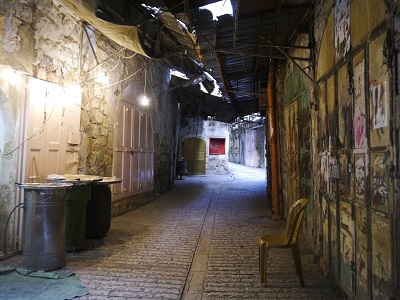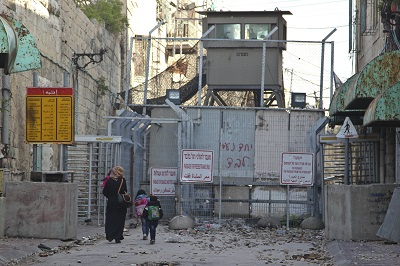PUBLICATIES - NPK-BERICHTEN
‘It Has Become A Prison’: The ghettoization of Hebron door Megan Hanna
Tel Rumeida Checkpoint (Photo: Megan Hanna)
Hebron’s Old City, located in the “H2 area” under full Israeli military control, is subject todramatic new restrictions introduced last week. Israeli soldiers seized several homes in the Tel Rumedia area and barred the residents from going in or out, declaring the area a military zone and banning access to non-residents, in a move that parallels security restrictions imposed recently upon areas of East Jerusalem.
Since the beginning of last month 22 Palestinians have been killed in Hebron, and nine in the Old City that has been the epicentre of escalating tensions.
Even for the 50 families who live in Tel Rumeida, who had a mere few days to register their name and ID card to the Israeli authorities, the plans will severely restrict their freedom of movement, as they will have to undergo rigorous security searches every time they wish to leave or enter their homes.
According to a resident of Tel Rumeida, “They told me I have the number 36 [on the list with who’s allowed to go in and out], it’s just like in prison. They try to make you a number, you’re not a person”.
Motasem Isied, 28, is a resident of Hebron and spoke to Mondoweiss about recent events: “It’s pretty disturbing what is happening here. As Palestinians we are familiar with these incidents – night raids, tear gas and so on – but everybody is incredibly frustrated and sad about what is happening in Hebron, because it has never been like this”.
“Now areas are controlled by names, so if you’re not on the list you are not allowed in. Some residents aren’t even on the list, so they can’t reach their homes. Those who can are completely socially isolated”.

Israeli soldiers in watchtower overlooking Hebron. (Photo: Megan Hanna)
Israel rights group B’Tselem claimed that the “immoral” moves are “draconian and not dictated by reality”, and “constitute collective punishment of residents of Hebron who are suspected of nothing and are forced to suffer serious disruptions in their daily lives”.
An IDF official commented claiming the measures are in reaction to the recent rise of violence, and are aimed at separating the Jewish and Palestinian populations of the city. Dubbed operation “Breathing Closure”, the plans have been enacted for vague “precautionary measures” to “contain potential attacks in the future and maintain the safety and well-being of Israelis”.
‘Young Palestinians are constantly a target’
On Oct. 26, Saad al-Atrash, 19, was shot seven times whilst walking in the Old City and left to bleed to death for 40 minutes, in what Amnesty International have called an “especially egregious case” of killings that seem more to resemble extrajudicial executions than acts of self-defense. Three days after al-Atrash was killed, another Palestinian identified as Mahdi al-Muhtasib, 23, was shot dead near the Ibrahimi Mosque.
“It was bad before, but the new order is shoot to kill, and then confirm the killing. They shoot then ask questions”, says Issa Amro, a local activist from Youths Against Settlements. “In the past, soldiers targeted people in the resistance, now there is the feeling among people that they will kill anyone”.
Dania Ersheid’s inert body and blood-soaked headscarf presented a particularly shocking image of the grave situation unfolding in the city. The 17-year old student was fatally shot on Oct. 22nd on her way to school by the Ibrahimi checkpoint by Israeli soldiers. According to a news report “the teen raised her arms and stated “I don’t have a knife” before she was shot with “eight to 10 bullets” before she fell to the ground”.
Also among those killed was 23 year-old Houmam Adnan Isied, Mostaem’s cousin. Speaking of the incident, Mostasem said, “It is all happening to young people, they are being targeted in cold-blooded killings, including my relative. He was killed in an area with a lot of CCTV cameras, and they claimed he was trying to stab a soldier, so we demanded to see them. Of course they refused.”
“We haven’t been able to even bury him yet, he was supposed to be released this week. Then they made a condition that they would release him only at midnight, and we had until 3am to bury him. But they still haven’t given him back.”
When voicing his fear over the unpredictable aggression of the Israeli military, Motasem said, “I can remember what was happening in the 1990s during the first intifada, and I fully lived through the second. Even though it was really dangerous, everybody agrees that we have never felt unsafe in the way we do now. Because you never know when, or where, or what the soldiers are going to do to you. As a young Palestinian, you are targeted at any time and at any place in Hebron.”
An international activist living in Hebron told Mondoweiss: ” I’ve witnessed the Israeli armies continuous crackdown on Palestinians, not only in Tel Rumeida, but everywhere in the H2 area. Seeing body-searches of Palestinians at gunpoint is not a rarity anymore – all while settlers are freely walking the streets and are never stopped or checked at all.”
To date, 80 Palestinians have been killed in the spate of violence across Israel and the occupied Palestinian territories that began at the beginning of last month. Of this figure, at least one third of Palestinians fatalities occurred in Hebron; where on average one Palestinian was wounded or killed every 3 hours in the city throughout October.
“It’s a ghost town now”

Empty market (Photo: Megan Hanna)
But such statistics have a limited scope in evoking the unsavoury reality of daily life for Palestinians currently living in Hebron. Motsaem spoke of how he is too anxious to go to the Old City now; “I went there only once recently, and there was no one in the streets, it was completely empty apart from soldiers. Shops by the Ibrahimi mosque have been under a direct military order to close for more than a week now, it’s affecting the families whose incomes rely on them”.
Hebron is unique compared to other cities in the West Bank due to the presence of 800 Zionist settlers living throughout the city, alongside double their number of Israeli soldiers who are predominantly based around 18 military checkpoints, which restrict the movement of 30,000 Palestinian inhabitants. Whilst the city is no stranger to violence and harsh military control, such extreme measures have not been imposed since the aftermath of the Goldstein Massacre in 1994, when Israeli authorities sealed access to certain areas and imposed a 24-hour curfew for six months. Residents are praying that these new military restrictions will not be as long-lived.
Megan Hanna - Mondoweiss, 11 november 2015
Megan Hanna is an independent freelance journalist and photographer, based in the occupied Palestinian territories. You can follow Megan on twitter via @Megan_Hanna_
Listen here the report (on video) by Stefanie Dekker Al Jazeera on 6 november 2015
Actuele NPK-berichten

 Er zijn inmiddels meer aanbieders van Palestijnse producten.
Er zijn inmiddels meer aanbieders van Palestijnse producten.
